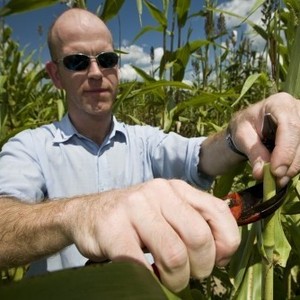Researchers hope better technology produces less costly biofuel

University of Florida Institute of Food and Agricultural Sciences
June 5, 2018
BY University of Florida Institute of Food and Agricultural Sciences
University of Florida scientists wondered how cheaply fuel ethanol can be made from inedible plant material—called biomass—using currently available technology.
Their goal is to make this form of ethanol less expensively than gasoline and help reduce greenhouse-gas emissions.
Currently, fuel ethanol is made from corn, which is edible. Corn also uses a lot of fertilizer and water.
But a UF bio-refinery pilot plant in Perry, Florida, uses crushed sugarcane and sweet sorghum stalks—also known as bagasse—to produce fuel ethanol. Scientists have already developed methods for producing fuel ethanol from biomass and the result is commonly called “cellulosic ethanol.”
Scientists believe cellulosic ethanol production could provide a large percentage of the nation’s transportation fuel. But to make that happen, researchers must find ways to produce it more cheaply than gasoline. Many scientists think fuel ethanol is the wave of the future because it produces smaller amounts of greenhouse gases when it’s burned, compared with gasoline.
The question for UF scientists: Can they produce the ethanol using one or more less-costly methods?
Advertisement
Advertisement
Study results showed that the lowest break-even price for producing cellulosic ethanol is still higher than the price of gasoline. At their most optimistic, UF/IFAS researchers say cellulosic ethanol could be produced for about $1.50 a gallon, which is still higher than the price that would make it cost-competitive with gasoline—about $1.29 per gallon.
Still Wilfred Vermerris, a UF/IFAS professor of microbiology and cell science, remains hopeful.
“We have all the ingredients to make this a reality, but process improvements are necessary,” said Vermerris, who led the study.
In the new study, Vermerris and his team wanted to see how much it costs to produce ethanol from bagasse. They found it costs $4.45 per gallon for ethanol. At a commercial scale, this would be $2.40 per gallon, about twice the cost of wholesale gasoline, Vermerris said.
To determine the most efficient way to convert feedstocks such as sugarcane and sorghum into ethanol, scientists need pilot biorefineries. Several commercial ethanol pilot plants in the U.S. stopped their operations, in part due to unforeseen problems in the processing of the biomass, Vermerris said. That shows how beneficial pilot plants could be, Vermerris said.
Advertisement
Advertisement
Among the tools researchers used to compare prices is the cost at which the biorefinery breaks even. They calculated this price using software that modeled the production process under different scenarios, Vermerris said.
UF/IFAS scientists then used data from the pilot-scale UF plant in Perry to model a commercial-scale refinery plant. They analyzed which part of the production process they need to optimize to reduce cost or energy use.
Study results showed the cost of the feedstock and the size of the biorefinery are key factors scientists must target to make cellulosic ethanol—produced from the stringy fiber of the plant—more cost-competitive with gasoline.
The gap between ethanol and gasoline prices could be bridged by lowering the cost and increasing the efficiency of enzymes needed to break down the cellulose into fermentable sugars. The process also would cost less by improving the process for fermentation and by developing value-added products from lignin, a glue-like plant polymer that holds cell walls together, he said.
“This means that in addition to technological advances in the bio-refinery, current efforts toward the development of low-input, high-yielding bioenergy crops, such as sweet sorghum, should continue,” Vermerris said.
The new study is published in the journal BioEnergy Research.
Related Stories
The U.S EPA on July 17 released data showing more than 1.9 billion RINs were generated under the RFS during June, down 11% when compared to the same month of last year. Total RIN generation for the first half of 2025 reached 11.17 billion.
The U.S. EPA on July 17 published updated small refinery exemption (SRE) data, reporting that six new SRE petitions have been filed under the RFS during the past month. A total of 195 SRE petitions are now pending.
European biodiesel producer Greenergy on July 10 confirmed plans to shut down its biodiesel plant in Immingham, Lincolnshire, U.K. The company temporarily suspended operations at the facility earlier this year.
Aemetis Inc., a renewable natural gas and biofuels company, announced on July 17 that its India subsidiary, Universal Biofuels, appointed Anjaneyulu Ganji as chief financial officer, effective July 17.
Avia Solutions Group, the world's largest ACMI (aircraft, crew, maintenance, and insurance) provider, has partnered with DHL Express to reduce greenhouse gas emissions from its international shipments using SAF.
Upcoming Events










